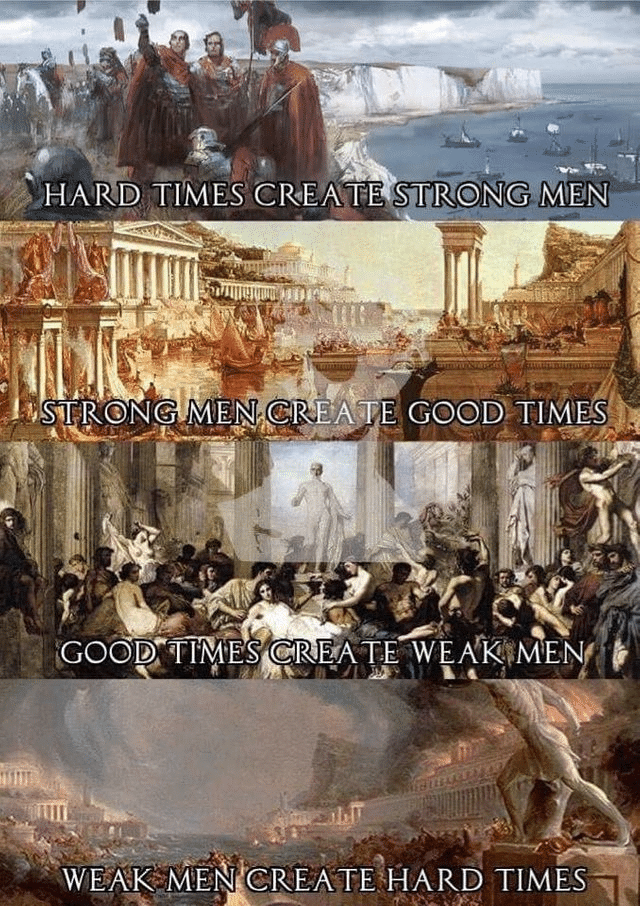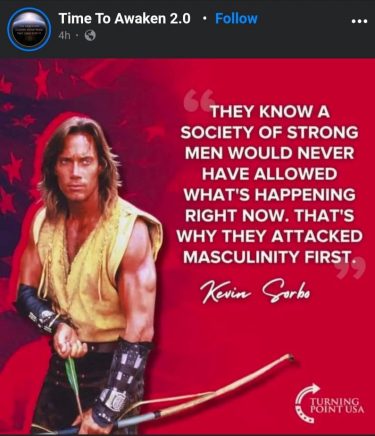We need to talk about men. As of the most recent vote counts, 60% of white American men voted for Trump, compared with 53% of white women. While those are not particularly surprising results, 25% of the Black men and 48% of Latino men also voted for Trump, compared to just 10% of the Black women and 39% of Latino women. Trump has doubled his share of Black male voters, and across all racial demographics his gains were highest among younger men. As always, problems like this are intersectional and multifaceted, but one of the crucial facets we need to discuss is clearly the persistent problem of disaffected men.
One likely reason for these gains is that the GOP offers narratives for meaning-making that appeal to young men who feel that modern society is depriving them of a meaningful life. Researchers have tied the ongoing crisis of meaning for men to harmful personal and political choices that result in worse outcomes for men and everyone around them. If we are looking for things that the left can do to address this problem, we can start by adopting a restorative approach towards men in general and the crisis of meaning many of them are experiencing.
This conversation is made far more difficult by the fact that conservatives like Jordan Peterson have dominated discourse around this topic – that conservative domination, combined with entirely understandable resentment and compassion fatigue towards men, leads many on the left to reject it as a problem worth considering. The common refrain is that men should just “suck it up”, and that “loss of privilege feels like oppression” – which is essentially a fancy way of saying men aren’t actually experiencing real problems, just bad vibes.
Vibes do matter though, and for an unfortunately large number of men, loss of privilege also feels like loss of meaning and purpose. Folks on the left have no trouble mocking Ben Shapiro for his thought-terminating cliché “facts don’t care about your feelings”, but whenever the issue of men’s feelings come up it is often tamped back down with facts about how things are actually perfectly fine for men right now, so people need to shut up about men’s feelings. But men’s feelings do matter, not just because men are people too, but also because having their feelings derided is driving a disturbing proportion of young men to find meaning in the worst possible places.
Everyone needs meaning in their lives. Society used to hand men a simple set of narratives for meaning-making: provider, protector, patriarch. Now some segments of the male population feel they are denied those paths, told that it is chauvinistic to see themselves that way, and that progress demands they sit down, shut up, and let others take the lead. While that is good and right for those who are finally being allowed to also participate in society, many men feel they are denied any appealing alternatives. If a large swathe of the population feels they are being denied avenues for meaning-making in their lives, it becomes everyone’s problem, because they will find a way to make their lives meaningful, and in the absence of water they will drink sand.
Enter the right-wing, with its endless talk of “strong men”. If you’ve spent any time in conservative spaces, you’ve likely seen some version of this meme:

For the right, this meme is an extremely popular way to explain the current state of the world and the people in it, but it also creates a narrative structure for meaning-making for men who currently feel deprived of purpose by modern society. It doesn’t just tell them how things are or how we got here, it tells them how things should be, and it gives them a path forward: become a strong man to lead people through the hard times and to preserve the coming good times from the corruption of weak men. That message is a big part of why Joe Rogan has the most popular podcast in America and commands an overwhelmingly male audience. Absurd as it may seem to those on the left, Rogan provides narratives about strength that are clearly appealing to and meeting a need for a lot of young men.
How do you make ‘strong’ men? According to the right, it’s by making them cruel. “Owning the libs” isn’t just entertainment and sport, it’s important psychological training for the civil war they believe is to come. Men must be callous if they’re going to ignore the demands for compassion that are weakening our society. If they can’t laugh in the face of someone who claims to be suffering, how will they be able to make the hard decisions needed to keep our country safe and prosperous? That’s the meaning narrative that seems to be attracting a significant portion of young men. It simultaneously shields them from all the moral obligations that progressive society wants to place on them, while providing them an alternative set of obligations that feel more empowering to them to fulfil. They get to be warriors who stand against the horde that threatens to overrun their society, both internal and external. They get to stand athwart history and shout “stop”.

Men who get pulled into this narrative also come to believe that their cruelty gives them greater insight into the world around them. In their view, the left is trapped in a woke fever dream and cruelty is the only medicine. This gives them the same hit of happy chemicals that conspiracy theorists get from the belief that they have secret knowledge. It allows them to deflect counter-arguments to their approach as based on ignorance and wishful thinking. Only strong men can face the horrors of reality without succumbing to copes like “equality” and “social justice”.
The challenge for the left is presenting alternatives that actually appeal to these men, which likely requires further dismantling of our patriarchal culture. Patriarchy prescribes for men a narrow set of narratives for meaning-making, but progressivism has failed to do much better. Too often, we offer men alternatives that appeal to us as progressives, and then mock them for their lack of uptake. We tell them that strong men are really compassionate and thoughtful, but for many men raised in a patriarchal society that rings hollow. We see this exemplified in incel culture, where men are taught that the mainstream narratives, such as that men can easily find a happy relationship if they just show their emotions more, are lies to keep men servile or sell more products. They’re taught that women secretly still prefer “strong” men, and that their only hope for true happiness is a return to traditional gender roles, because for men true meaning is based in power.
The problem is that meaning-making is heavily subjective. It’s not enough to tell men their lives will have meaning, they need to feel that their lives have meaning, and it has to be meaning they and their peers and the people they look up to view as worthy of respect. Solving this problem will require restorative approaches at the interpersonal level, along with continued efforts to dismantle the systems that cause men to feel that only dominance-based narratives hold meaning for them.
In the short term, this will require helping men feel socially respected again, something that the left struggles to provide. Bluntly put, we need to stop reflexively shitting on men, those need to be mostly ‘indoor thoughts’, same as they are with any other group. The urge to degenerate men as a group as a form of retributive punishment, putting them in their place, is a problem on the left, both morally and politically. The urge is understandable, but we need to get it under control, because young men are well aware of how they are perceived and it is hurting them, and by extension, society in general.
We also need to stop denying them respect for their efforts towards social justice. In many leftist spaces, we give men ways to help, but out of a sense of retributive fairness we deny them any validation for doing the work. Yes, you can be a good ally, but don’t ever expect appreciation, because that work is simply the bare minimum expected of you as a person of privilege. If you ask for respect, you clearly weren’t being an ally for the right reasons and so need to be put even more in your place. It is understandable why some men see this as a no-win situation and cast about for alternatives. If the left is going to help them, we need to abandon the retributive strain of social justice in favour of restorative social justice practices. That starts with recognising that everyone’s needs matter, including the need for respect, and that nobody deserves to suffer, even men.
In Pedagogy of the Oppressed, the influential progressive educator Paolo Freire argues that “the great humanistic and historical task of the oppressed” is “to liberate themselves and their oppressors as well” (Freire, 2000, p. 32). That is a hard pill for many to swallow in this day and age, where the oppressed are so thoroughly prevented from liberating themselves it can seem absurd to burden them with also liberating their oppressors. But it is a common refrain on the left that patriarchy harms everyone, including men. It gives them such a narrow window for meaning-making that when those conventional narratives are challenged, either by wokeness or the collapse of manufacturing and other masculine coded roles, they feel a lack of options that drives them to despair. That despair is then commodified by the same capitalist system that also commodifies everyone’s attempts at meaning-making and flourishing, depriving everyone of the energy and resources needed to address these problems.
We need to stop mocking men for their despair, and those of us with the energy to do so need to work on this problem at both the systemic and individual level. Especially progressive men, whose privilege makes it easier to cope with compassion fatigue. It is our job to show compassion and respect while helping other men understand that it is patriarchy and capitalism that are depriving them of meaningful lives, not minorities.
We can’t and shouldn’t offer men a return to the old, oppressive paths for meaning-making, so we need to shift the systems that limit their access to ethical alternatives. This is not a problem with quick solutions, cultural shift like this is measured in decades and centuries, but we don’t have another option. Men will not simply “suck it up” and accept lives that feel meaningless to them. They will fight back and force the world to respect them again, at gunpoint if necessary. I don’t know if we can prevent that reality at this point, but it is our obligation as progressives to try.



